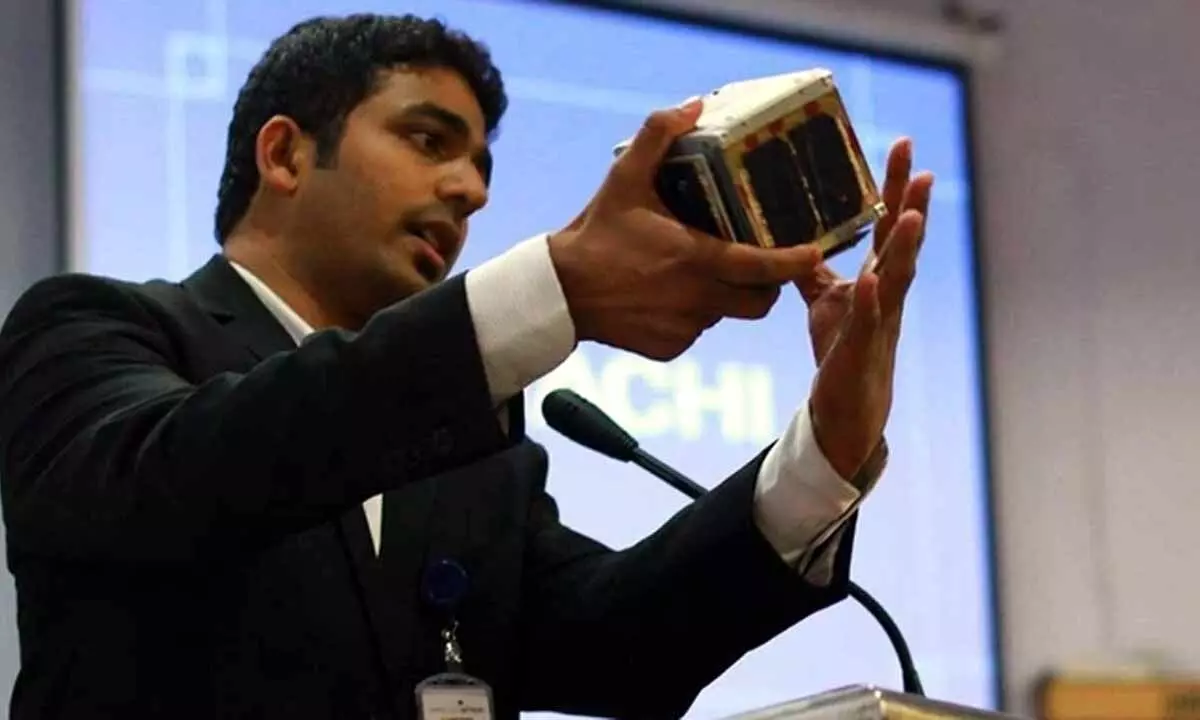Live
- Basu Hanumanthu Naidu Graces Sri Sadguru Tyagaraja Swami Aradhana Mahotsavam in Aija
- Motivational Classes and Mid-Day Meal Scheme Review Conducted for Student Development
- Rajasthan govt launches online interactive interface for investors to track MoU progress
- CM Revanth Reddy Unveils Plans to Boost Temple, Health, and Eco-Tourism in Telangana
- Telangana CM Revanth Reddy Forms High-Level Committee on Sand Supply Policy for Indiramma Housing Scheme
- Yamuna water contamination: Atishi says EC has assured help in public interest
- Jindal Steel and Power to invest another Rs 70,000 crore in Odisha
- Shark Tank India Pitcher Faces Controversy After Spending Rs 14 Crore of Husband’s Money on Business
- Hubballi Man Dies by Suicide, Accusing Estranged Wife of Harassment
- Delhi poll rally: Rahul Gandhi trains guns at Kejriwal over ‘Sheeshmahal’
Just In
Meet Sanjay Nekkanti, Co-Founder of India's First Aerospace Start-Up


Sanjay Nekkanti, CEO, Dhruva Space
Electronics and space technology from India has accelerated to new heights, owing to a boost in Research and Development and manufacturing capacities.
New Delhi: Electronics and space technology from India has accelerated to new heights, owing to a boost in Research and Development and manufacturing capacities. Sanjay Nekkanti, Co-founder of Dhruva Space believes that the satellite technology segment in India has gained much appreciation and support in India and has a long way to go in serving the global community.
Nekkanti started building satellites at the age of 19 and at present is heading India's first space technology start-up. The young entrepreneur spoke to Hans India on the electronic component manufacturing capacities in India at present and how Central government schemes are reviving a healthy competition amongst manufacturers.
"In the 60's and the 70's there was a lot of component manufacturing that happened in the country. Due to policy changes, a lot of companies moved away from manufacturing to trading. But now with the new government policies coming in, such as AtmaNirbhar Bharat, I think there is also from the startups and MSMEs to go back to the point of manufacturing and building products," Nekkanti told Hans India.
Nekkanti's company Dhruva Space is aiming to build satellite products and allied services which can serve both global as well as the domestic market. The entrepreneur believes that the roll-out of schemes such as Atmanirbhar Bharat has resulted in India's start-up ecosystem to garner accolades for the acceleration of technology output and improved service quality.
The reality, however, remains that the manufacturing segment in India is nowhere close to becoming independent of import of materials as most manufacturing companies do not have access to raw materials and components within the domestic market.
While speaking at the Bizz Buzz Business Conclave in Visakhapatnam last week, Nekkanti stated that the Andhra Pradesh government can also support young learners to build and launch students' satellites at an institutional level. On the untapped potential use of satellites, Sanjay Nekkanti believes that manufacturing small satellites holds great scope.
"When we usually think of satellites, we assume it's the size of a school bus but over the years the sizes of satellites have shrunk. We build satellites that are the size of a small tiffin box or a desktop printer. There is a lot of need for these small satellites globally. There have been 400 to 500 MSMEs that have been supporting the Indian space program for the last three to four decades. So, there are very good opportunities for these companies to look at evolving from serving component level to building the full product level and serving customers outside of India," he said.
On the sustainability aspect, the company's Co-Founder believes that now companies are cautious about keeping space clean. According to Nekkanti, alternatives such as green propulsions are being used by space tech companies that generally don't cause too much damage in space.
Elaborating on the sustainability aspect, Nekkanti said, "So, most of these small satellites because once you launch them, they re-enter the earth within a short span of time. So, the lifetime can be anywhere between one year to five years depending upon its application. Companies do take it into consideration that they don't create space debris in orbit. The second aspect is that a lot of companies have been developing newer types of propulsion systems."
"On a completely different perspective, we are about 8 billion people and how big is space? It's infinite, it's vast. There are probably 15,000 to 20,000 objects, so there is definitely room for different things to come in but it is extremely important to be responsible for the usage of space, which has already begun," he added.

© 2025 Hyderabad Media House Limited/The Hans India. All rights reserved. Powered by hocalwire.com






